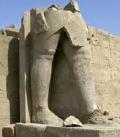 For those who might not know: HTML ("HyperText Markup Language") is the most basic way of encoding a page on the World Wide Web (which is part of the Internet). The JPG file format is a common way of encoding still photographs. "JPG" is a shortened version of "JPEG", which stands for "Joint Picture Experts Group". Why HTML? Well, I'm hoping that what I write will outlive me, and I need a medium that stands a chance of being readable for a long time. Many readers will recognize the words of the poem "Ozymandias", by Percy Bysshe Shelley:
Stand in the desert. ... And on the pedestal these words appear: 'My name is Ozymandias, King of Kings Look upon my works, ye Mighty, and despair!' Nothing beside remains round the decay of that colossal wreck. Boundless and bare, the lone and level sands stretch far away. Nothing lasts forever. Inks fade, paper crumbles, records are lost or destroyed, and until recently, a copy of anything, of necessity, was a slightly degraded version of the original (think of making a copy of a VCR tape Note 1). But digital technology does make it possible to keep things forever, essentially because digital technology allows the creation of copies that are exact replicas of the original. Not 99% accurate replicas, not 99.99% accurate replicas, but in fact exact replicas, as good as the original, with nothing lost. Because exact copies can be made, a document can be kept in various places, to avoid loss or destruction. As the medium on which the document is carried (a floppy disc, for instance) begins to physically decay, an exact copy can be made, and the physical medium is suddenly as new as the original was on the day it was created. If the device for reading the medium is about to become obsolete (my computer no longer has a floppy disc drive), the data on it can be copied to another medium, such as a CD-ROM. Since a digital file is a digital file, it can be moved from one carrier to another as media change. But there's another issue: the format of the digital file. My initial thought was that I should create only ASCII text files, thinking that this would be the only format I could count on being readable for hundreds of years. But then someone pointed out the number of web pages that now exist in the form of HTML files. One Wikipedia estimate Note 2 stated that as of March 2009, the indexable web contained at least 25.21 billion (25,210,000,000) pages. Although HTML is a much more complex coding than a simple text file, I think that it should remain readable for a long time. There will probably be more intelligibility issues from changes in the English language over time than from issues arising from a loss of ability to interpret basic HTML. And of course, HTML provides a great deal of formatting flexibility - that's what it was designed to do. Finally, I want to be able to include photographs, and for the same reason that I expect HTML to be readable for a long time, I'm hoping that the .jpg format will also be viewable for centuries. That's it; everything I'm creating here is coded in either vanilla HTML (nothing fancy), or, for photographs, as a .jpg file. When I mentioned my HTML writings to a Facebook friend, she urged me to "... consider printing your thoughts on that old fashioned medium, paper, as well as electronically. It would be a kind of hard copy backup in case the technology is lost." Well, of course my pages can be printed (that's why they are formatted in a column 600 pixels wide), and of course I'll print some copies. I might even print some (or have them printed) on acid-free, archival paper, with archival color inks, designed to last 100 years. But my guess is that if anyone remains interested in keeping these words alive, then it's the digital form that's more apt to stand the test of time. We'll see. Well, I won't, but someone will. All this assumes that there will be someone, at any given time, interested in putting in at least a minimal effort to preserve these words; someone who finds them interesting enough to leave them posted up in the internet "cloud". Perhaps this is just hubris. We'll see. Well again, I won't, but someone will. Look upon my blog, ye Mighty, and despair!'   Note 1: It occurs to me that the VCR ("Video Cassette Recorder") is already almost obsolete as I write these words in November of 2009, and it won't be long before readers will have no idea what I am talking about. A Video Cassette Recorder recorded (low-definition) television signals on a wide (1.27 cm. = 0.5 inch) magnetic tape inside a cassette, using an angled spinning recording head that recorded diagonal stripes along the tape. For the purposes of this discussion, what's important is that the recording was analog, so that any copies made were degraded versions of the original (usually pretty seriously degraded). [return to text] Note 2: http://en.wikipedia.org/wiki/World_Wide_Web [return to text]  |
